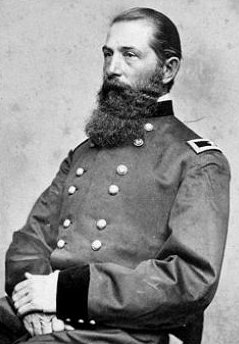David Allen Russell facts for kids
Quick facts for kids
David Allen Russell
|
|
|---|---|
 |
|
| Born | December 10, 1820 Salem, New York |
| Died | September 19, 1864 (aged 43) Winchester, Virginia |
| Buried |
Evergreen Cemetery, Salem, New York
|
| Allegiance | United States of America Union |
| Service/ |
United States Army Union Army |
| Years of service | 1845–1864 |
| Rank | |
| Commands held | 7th Regiment Massachusetts Volunteer Infantry |
| Battles/wars | Mexican–American War
|
David Allen Russell (born December 10, 1820 – died September 19, 1864) was a brave officer in the United States Army. He fought in two major conflicts: the Mexican–American War and the American Civil War. Sadly, he was killed during the Civil War while serving as a brigadier general for the Union Army.
Contents
Early Life and Military Start
David Allen Russell was born in Salem, New York. His father, David Abel Russell, was a politician who served in the House of Representatives. In 1841, his father helped him get into the United States Military Academy. David graduated from West Point in 1845. His first job was with the U.S. 1st Infantry Regiment.
Fighting in Mexico
Soon after, Russell joined the U.S. 4th Infantry Regiment and fought in the Mexican–American War. He showed great bravery in battles like the Battle of Paso Ovejas and the Battle of Cerro Gordo. Because of his courage, he was given a special temporary promotion. In 1848, he was promoted to first lieutenant.
Service in the Pacific Northwest
After the war with Mexico, Russell's regiment moved to the Pacific Northwest. There, he fought in the Rogue River War and the Yakima War. These conflicts were against local Native American tribes. In 1854, he was promoted to captain.
Civil War Service
In 1861, the 4th Infantry was called back East to help protect Washington, D.C.. David Russell joined the volunteer army. He became a colonel and led the 7th Regiment Massachusetts Volunteer Infantry.
Early Campaigns
Colonel Russell and his troops fought in the Peninsula Campaign. They also took part in the Seven Days Battles. For his brave actions, he received another special promotion to lieutenant colonel in the regular army.
Key Battles and Promotions
In 1862, Russell was promoted to major in the regular army. He was assigned to the U.S. 8th Infantry Regiment. Still leading the 7th Massachusetts, he fought in the important Battle of Antietam. Later that year, Russell became a brigadier general of volunteers. He commanded a group of soldiers called a brigade during the Rappahannock campaign. He also fought in the Battle of Fredericksburg. Russell's brigade was mostly kept in reserve during the Battle of Gettysburg. Afterward, he received another special promotion to colonel in the regular army.
Final Campaign and Death
In 1864, General Russell fought in the Overland Campaign. Later that year, he was badly wounded in the Shenandoah Valley. This happened during the Battle of Opequon, also known as the Third Battle of Winchester. He was hit by a piece of a shell and died from his injuries on September 19, 1864.
After his death, President Andrew Johnson nominated Russell for a special promotion. He was made a major general in the regular army. This promotion was made official on February 14, 1868, and dated back to the day he died. David Russell is buried in Evergreen Cemetery in Salem, New York.
Honoring David Russell
Several places were named to remember David Allen Russell.
- Fort D. A. Russell in the Wyoming Territory was built in 1867. It was named after him. Later, in 1930, this fort was renamed for Governor Francis E. Warren.
- After that, Camp Marfa, built in 1911 near Marfa, Texas, became Fort D. A. Russell. This fort closed in 1945 after World War II.
- A gun battery, called Gun Battery David A. Russell, is located in Fort Stevens State Park in Hammond, Oregon. It is also named in his honor.

